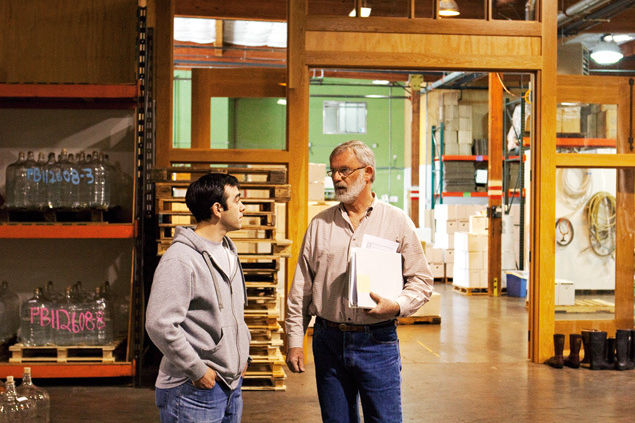And Now, Meet Your Makers
House Distillers occupies a nondescript space on SE Seventh Avenue that once housed a food-photography studio and, before that, an automotive shop. Tucked within the mini-skyline of vats and rows of raw-oak barrels is a small kitchen with a bar. We’ve barely arrived when House co-owner Christian Krogstad starts pulling out jiggers, a juicer, some limes, elderflower liqueur, gin, sugar, a julep strainer, ice. He loads it all into a Boston shaker and reefs the hell out of it over his left shoulder (a six-second shake is optimal).
We get a gimlet, and then we get a sidecar made with Clear Creek Distillery pear brandy. Clear Creek is across town, and is owned by another fella, Stephen McCarthy, but good distillers know when to give a competitor his due, especially when the competitor is widely credited for starting the whole Oregon microdistilling scene. “If you’re by yourself, it’s a novelty, a curiosity,” Krogstad is saying. “Get eight distilleries in town and it’s a movement.”
With five of these eight craft distilleries located on and around SE Seventh Avenue and Hawthorne Boulevard, the area is already becoming known as the Distillery District. What a lot of Portlanders may not know is how accessible the distilleries are—most open up regularly for tours, tastings, and retail. In House’s “apothecary,” for instance, you’ll find not only their liquors for sale, but also absinthe spoons, cocktail shakers, and T-shirts alongside display jars of star anise, caraway, limestone, lavender, and other materials that help make the company’s spirits.
The distillery entrepreneurship of course follows the microbrewery boom of two decades ago, when brewers started crafting beers with local grains and water, and with the do-it-yourself mind-set that has come to characterize Portland. “People recognize that microdistilleries are going the same direction as breweries did, but faster,” Krogstad says. He and other members of the Oregon Distillers Guild (the only such guild in the nation, it turns a year old this month) are betting that even if craft distillers can’t out-shout the marketing of international powerhouses like Grey Goose, they’ll command a following if they simply continue making good liquor. “It took a while for beer drinkers to realize that a locally made beer can be as good as anything made in St. Louis,” Krogstad says. “That’s where craft distillers are now.” Here’s a guide to who’s making what. —Paige Williams
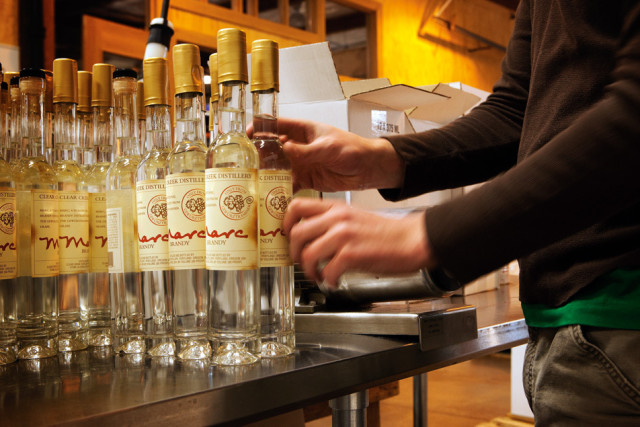
Image: David Emmite
Artisan Spirits
The distillers Shane Thatcher, Ryan Csanky, and Erik Martin own Oregon’s newest homegrown spirit-maker, though Csanky and Martin do most of the distilling. Martin is also president of the Oregon Distillers Guild.
The place With infused vodkas, distillers typically add flavors to the alcohol after distillation, but Artisan tosses in its inventive tongue-pleasers during the process. Based on an old Russian recipe, Apia is distilled from honey, giving it a hint of clover and thick, golden sweetness. For Martin Ryan, the distillers incorporated some of the Northwest’s best wines to yield a slightly fruity, floral taste.
The philosophy Vodka is a bit like soccer: widespread and beloved throughout the world, downtrodden and ignored in the States. Artisan’s goal is to rescue the clear liquor from a glut of powerful mixers and raise it to the level of a fashionable, sip-worthy beverage you can enjoy all by its lonesome.
The future Artisan is gearing up to try a couple of gin and absinthe recipes, with an eye toward brown liquors. —Bart W. Blasengame
Clear Creek Distillery
The distillers Known as the grandfather of Portland’s craft-distillery movement, Stephen McCarthy started Clear Creek in 1985, and started making eau-de-vie (fruit brandy) from the fruit of his parents’ Hood River Valley farm. His pear brandy is now famous and still features Bartlett pears. McCarthy was the first American distiller to make grappa, and in 1987 he persuaded the Oregon legislature to allow small-batch distillers to sell their own products and host tastings on-site.
The place The distillery itself operates out of a large warehouse on the edge of the Northwest industrial district. The space contains four gleaming copper stills imported from Germany and a temperature-controlled room stacked with Oregon white oak, old cognac, and French oak barrels filled with single-malt whiskey, apple brandy, and Oregon pot-distilled brandy, respectively. It’s especially nice to drop by Clear Creek’s tasting room in the fall, when the sweet scent of five hundred thousand pounds of fermenting Bartlett pears wafts for several blocks. The tasting room is almost always open to visitors, except on major holidays and “occasionally when we go to the pear orchard or are picking Douglas fir buds,” as the website puts it. The distillery recommends scheduling tastings by appointment, especially for groups of five or more.
The philosophy “It’s a matter of less is more,” McCarthy says. “This is not a manufactured product. This is something that we very gently take from what we were given to work with.”
The future This August, Clear Creek plans to release its biggest batch of whiskey to date—five hundred cases. —Brian M. Barker
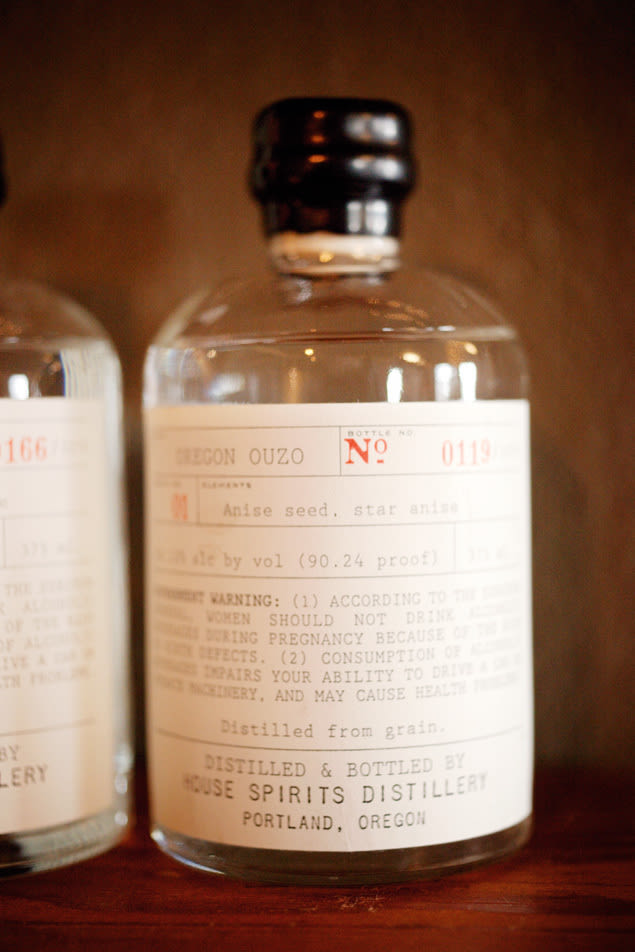
Image: David Emmite
Highball Distillery
The distillers Cofounders Michael Heavener and Michael Klinglesmith met as members of a Reed College juggling club and bonded over a shared interest in vodka and local organics. They came up with the idea to become distillers in 2005, and last July, after two and a half years dedicated to research, development, and acquiring organic certification, the Michaels opened Highball and began producing Elemental, their organic, handcrafted vodka. The place Like most distilleries, Highball has a warehouse feel. The main room houses a three-hundred-gallon kettle; a tiny tasting room and retail area anchor the production space.
The philosophy Highball uses only organic Pacific Northwest light wheat in its distillation process. The company’s goal is to create a product that reflects local resources without pillaging them. Leftover wheat goes back to farms for livestock grazing. Even the distillery’s equipment, which the founders built by hand, runs fully on sustainable energy via PGE’s Clean Air program.
The future “We just want to see what else we can create,” Heavener says. He’s currently experimenting with flavored vodka for the summer sipping season. —Kaitlin Johnson
House Spirits Distillery and Apothecary
The distillers Founders Lee Medoff and Christian Krogstad met as brewmasters at McMenamins, but their love of booze went beyond barley and hops. In 2002, the pair founded House Spirits. Medoyeff Vodka was their first creation; two years later, the duo paired with Seattle mixology guru Ryan Margarian to create the wildly popular Aviation gin.
The place House maintains a cocktail boutique adjacent to its distillery. Lined with bottles and beakers of the newest concoctions, the “apothecary” offers samples of everything from grappa to ouzo to absinthe, as well as House’s regular vodka, gin, and aquavit. In the “Whisk(e)y Your Way” program, customers can make their own whiskey, working with a distiller to choose everything from the grains to the barrel. Of course, they have to wait at least two years (and pay $5,000) to enjoy their personalized sauce. And House’s “recession-proof mixology program” runs every Wednesday night, when the House guys guest-bartend at local restaurants and bars—Biwa, Carlyle, and Bar Avignon so far, with Gold Dust Meridian, Silverado, and Sassy’s to come.
The philosophy House uses local ingredients whenever possible—Northwest malt for their whiskey, for instance. Medoff and Krogstad experienced the microbrewery explosion of the 1990s and founded House as a way to foster a similar attitude toward producing well-crafted, small-batch liquor. “It’s
like cooking,” Krogstad says. “But with a little more science.”
The future This June, House will partner with one local microbrewery per month to make beer schnapps, which will then be sold at that brewpub alongside the beers that inspired the spirits. But their secret? “We started House because we wanted to make whiskey,” says Krogstad. This spring, House will introduce bottlings of the whiskey Medoff and Krogstad have kept in barrels for one to four years. The line forms here. —Kasey Cordell
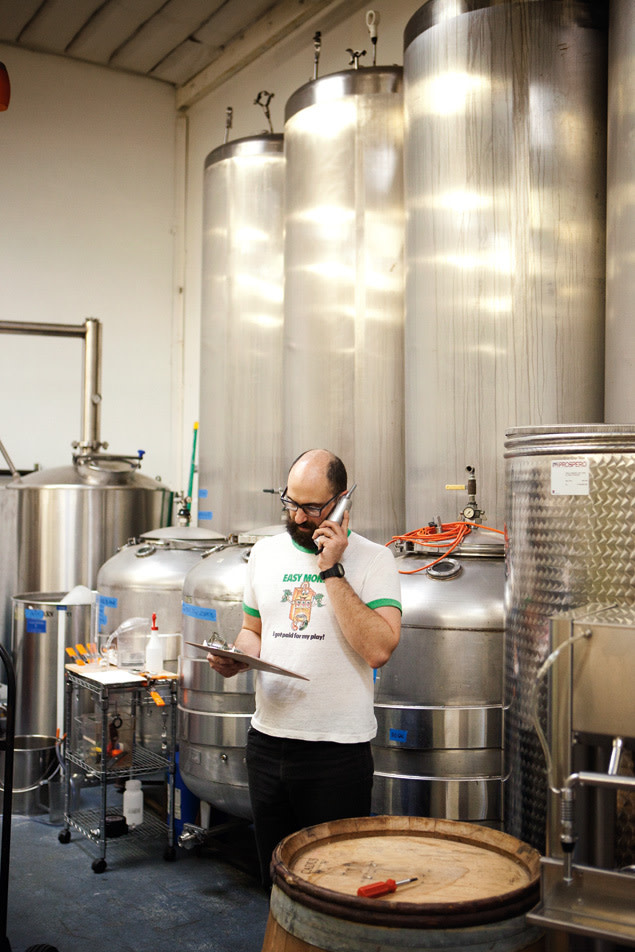
Matt Mount of House Spirits
Image: David Emmite
Indio Spirits
The distillers After toiling in the restaurant and bar business for the better part of fourteen years, owner John Ufford had tasted enough bland, mass-produced alcohol to know Portland deserved better. He started Indio in 2004.
The place The company is headquartered in Portland but distills in Cottage Grove, near Eugene. Ufford likes to point out that Indio’s Silver Edition vodka is triple-filtered via charcoal-activated coconut husks, which allows the rye to come through sweet and clean. Indio’s website features archived mixology segments hosted by portlandcookstv.com and local bartenders.
The philosophy Indio infuses its vodka not just with locally sourced flavors, but also with otherwise obscure (or unheard of) combinations like lemongrass-lime, for “a more authentic taste.”
The future The distillery is working on a batch of rum aged for three years. Indio is also starting to make cocktail mixes, including an all-natural concoction with red hibiscus. —BWB and KJ
Integrity Spirits
The distillers Founders and longtime friends Kieran Sienkiewicz and Rich Phillips grew up together on the Sienkiewicz family’s Willamette Valley vineyard. Sienkiewicz became a distiller and brewer for Rogue Spirits before he and Phillips, then a manager at Uptown Liquor in Northwest Portland, formed Integrity in 2007. They were the second in the country to begin making absinthe after the hundred-year ban was lifted in 2007.
The place Integrity shares its Southeast Portland space with the Green Dragon brewpub. You just might catch a glimpse of Phillips or Sienkiewicz distilling the latest batch of 12 Bridges gin through one of the windows on the shared interior wall as you suck down a cocktail made with the stuff.
The philosophy “Ultimately, we’re looking to make something that you can drink just on its own,” says Phillips. “You don’t need a cocktail to mask the taste of the alcohol.” Integrity makes its small batches with high-quality ingredients and uses a handmade copper still crafted for them in Portugal. “We couldn’t call ourselves ‘Integrity’ if we didn’t do the best we could on each batch,” Phillips says.
The future Trillium Absinthe was served at an inauguration party for Barack Obama in Washington, DC, and a Phoenix bar recently ordered five cases. —KC
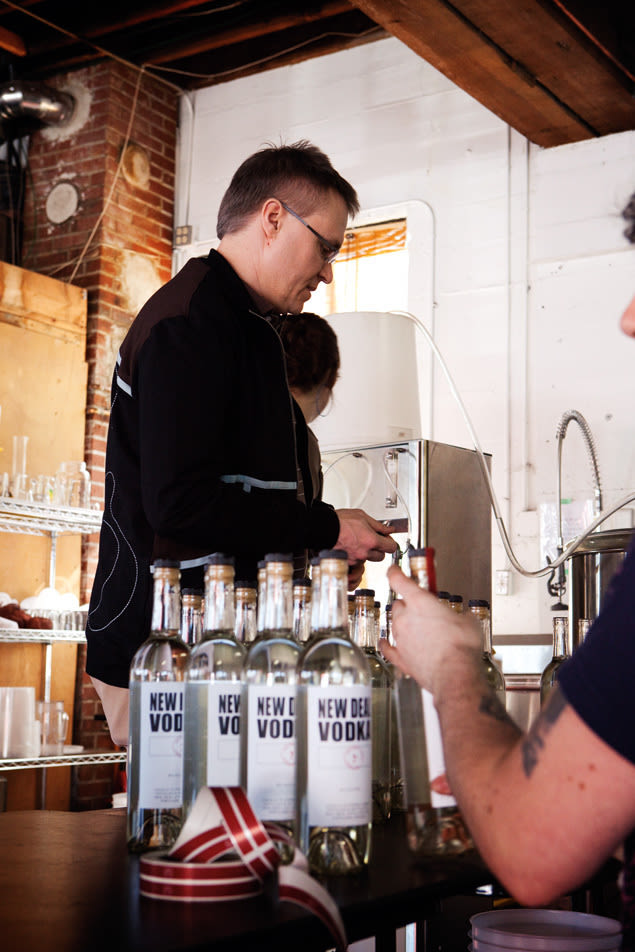
Tom Burkleaux of New Deal
Image: David Emmite
New Deal Distillery
The distillers Business partners Tom Burkleaux and Matthew VanWinkle have been making quality hooch since 2003; they were the first vodka distillers in Portland.
The place The free Saturday distillery tour is where it’s at, and not just because you get to sample all the New Deal stock. When Burkleaux gets excited (which is often), he’s liable to dig through his unmarked boxes of unreleased stash: a hyperdistilled brew he calls beer schnapps, or an ungodly shot combination called the “mole”—as in the spicy Mexican sauce. You can buy vodkas and Loft Organic Liqueurs there, too. The distillery hosts tastings every Friday at local liquor stores and lists each event on its website. For group tours, call the distillery.
The philosophy Like it says on the bottle: “Made by local folks for local folks. Of course, eventually we plan to rule the world.”
The future A chocolate-flavored vodka called Mud Puddle. —BWB
Rogue Spirits
The distillers Looking to expand on the success of his award-winning ales, Jack Joyce, who cofounded Rogue’s Newport-based brewery in 1989, decided to install rum stills above the bar at Rogue’s Pearl District outpost in 2003. Nicknamed “Tin Man” and “Hank,” the fifty- and ninety-gallon stills were the first rum stills in the state. (“Hank” was installed in 2008.) “No one else was doing rum—we like to be different,” says distiller Mel Heim, who, incidentally, is thought to be one of only three female distillers in the country. Rogue has collected more than forty awards for its spirits.
The place Rogue’s rum distillery is located at Rogue Distillery & Public House, a three-story Pearl District building that once housed a milk plant and the 1980s-era Portland Brewing Company. The House of Spirits, the company’s Newport-based gin and whiskey distillery, operates from a converted bait-and-tackle shop overlooking the Yaquina Bay Bridge and the Pacific Ocean. At the Pearl location, climb the metal-plated stairs above the bar for a tour and a complimentary tasting.
The philosophy “We make products with a twist, a story, a reason to be,” says Gary Fleshman, Rogue’s general manager. “Hazelnut rum using Oregon nuts; spruce gin (we don’t have juniper on the coast); pink gin with color and taste, from being aged in Oregon pinot noir barrels.”
The future After the release of its Dead Guy Whiskey in December, Rogue has been staffing the Newport distillery around the clock to meet demand—about three hundred cases per month. Fleshman hints that the distillers have been experimenting with vodka distilled from wine. —BMB
